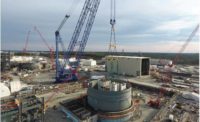Days after ex-employees of SCANA Corp. testified about alleged wrongdoing related to the failed V.C. Summer nuclear project, the utility settled a class action lawsuit with the state of South Carolina. The settlement returns roughly $2 billion to ratepayers who had been stuck paying for the unfinished nuclear plant, which SCANA and Santee Cooper abandoned in 2017. The lawsuit was brought by current and former electric customers of South Carolina Electric & Gas, a SCANA subsidiary.
According to a SCANA press statement, the proposed settlement will provide “up to $2 billion in future electric rate relief.” The utility adds that the settlement also addresses the state’s arguments that the Base Load Review Act—the South Carolina law that helped establish a mechanism for funding the V.C. Summer project—is unconstitutional. The settlement requires court approval, and the Public Service Commission must give final approval of a merger between SCANA Corp. and Dominion Energy for it to take effect.
Reaching this settlement “ends our pursuit for restitution to ratepayers, but does not end our inquiry into the individual actors that may have contributed to the project’s failure,” South Carolina Attorney General Alan Wilson said in a statement.
That inquiry into the undoing of the V.C. Summer nuclear plant expansion—canceled in March 2017—was the subject of weeks-long hearings by the PSC that began Nov. 1. There, some of the biggest drama surrounded whether Carlette Walker—SCANA’s former vice president for nuclear finance administration—would testify. South Carolina’s Office of Regulatory Staff had pointed to Walker’s unredacted deposition as it argued for disallowing approximately $1.87 billion in previously approved project costs.
Walker did testify. At the state hearings, she didn’t back away from her dramatic deposition statement, in which she called SCANA’s former Chief Executive Officer Kevin Marsh a “liar.”
Most notably, she testified that in 2015, while she was on company leave, other SCANA personnel—without her knowledge—wrote testimony in her name and filed it to the PSC. Significantly, that testimony included an estimated cost to complete the project that was significantly lower than the estimate that SCANA’s nuclear finance administration team had calculated.
False Testimony?
As one of the SCANA executives designated to testify to the PSC about the status of the V.C. Summer project—and as a certified public accountant—Walker wanted to provide the best estimate possible, she says. The problem was, she says, SCANA executives didn't want her to use the estimated cost to complete that she and her staff had calculated. Instead, they wanted to use the figure that the consortium of CB&I and Westinghouse was using, which was roughly $500 million lower than the number she wanted to use.
In her recent testimony to the PSC, Walker—who ended up resigning from SCANA after more than 30 years with the company—characterized the situation by stating: "I was a victim of a conspiracy of five SCANA senior executives to run me out of the company because of fear I was not going to support their decision to lie and deceive both the Public Service Commission and the investment community as to the true financial health and construction schedule for the New Nuclear Deployment known as NND in Jenkinsville, S.C."
In her role, Walker was charged with ensuring that the utility's project expenses were justified by the contract. Here, too, Walker testified that she became frustrated by what she perceived as a lack of support by upper management.
"As early as the end of 2014, I had become feeling uncomfortable with the management's lack of involvement in the project and the site management’s willingness to accept the consortium’s excuses and substandard work products," Walker stated.
After taking on her role overseeing the project's finances, Walker set up an office at the Jenkinsville site. From there, she testified: "It didn’t take me long to realize that the project was having serious problems meeting construction and cost schedules." The contractor's performance factor--a ratio used to assess the actual amount of time needed to complete a task versus the amount of time that had been estimated for that task—kept getting worse and "never showed any sign of improvement," she added.
Testifying alongside Walker was Kenneth Browne, a former engineer with SCE&G who was involved with oversight of the project's schedule and work progress. He, too, saw the construction consortium begin to fall behind schedule, as early as 2012. Additionally, he also asserted that SCANA execs failed to properly inform the PSC of the project's status. In his prepared remarks, Browne noted the regret he felt when he decided to leave the company.
"I could not escape the guilt of knowing that I had participated in what I knew was sure to become the largest financial catastrophe ever to occur in the state," he stated.
A federal investigation into SCANA's handling of the nuclear project is reportedly ongoing.






Post a comment to this article
Report Abusive Comment